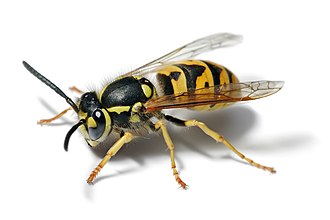Fly
Article about flies
Flies are insects of the order Diptera, the name being derived from the Greek δι- di- "two", and πτερόν pteron "wing". Insects of this order use only a single pair of wings to fly, the hindwings having evolved into advanced mechanosensory organs known as halteres, which act as high-speed sensors of rotational movement and allow them to perform advanced aerobatics.
Characteristics[edit]
Flies are adapted for aerial movement and typically have a pair of functional wings on the mesothorax and a pair of halteres on the metathorax. The halteres are small, knobbed structures that act as gyroscopic stabilizers, providing feedback to the fly about its position in space. This adaptation allows flies to perform complex aerial maneuvers.

Flies have a mobile head, with a pair of large compound eyes, and mouthparts designed for piercing and sucking, or for lapping and sucking in the more primitive groups. Their life cycle consists of an egg, larval, pupal, and adult stage, with the larval stage being a maggot in many species.
Ecology[edit]
Flies are found in almost all terrestrial habitats in the world, including deserts, forests, and urban areas. They play a crucial role in the ecosystem as pollinators, decomposers, and as a food source for other animals. Some species are important pollinators, while others are vectors of diseases.

Flies are also known for their rapid reproduction and short life cycles, which allow them to quickly exploit new environments. This adaptability makes them one of the most widespread and diverse groups of insects.
Classification[edit]
The order Diptera is divided into two suborders: Nematocera and Brachycera. Nematocera includes the more primitive flies such as mosquitoes and crane flies, while Brachycera includes the more advanced flies such as houseflies and blowflies.
Nematocera[edit]
Nematocera are characterized by their elongated bodies and long, filamentous antennae. They include families such as Culicidae (mosquitoes) and Tipulidae (crane flies).
Brachycera[edit]
Brachycera have shorter, more robust bodies and shorter antennae. This suborder includes the Tabanidae (horse flies), Syrphidae (hoverflies), and Muscidae (houseflies).
Evolution[edit]
Flies are believed to have evolved during the Triassic period, over 240 million years ago. They have since diversified into a wide range of forms and occupy a variety of ecological niches.

Human Interaction[edit]
Flies have a significant impact on human activities. Some species are beneficial as pollinators or as biological control agents, while others are pests that can spread diseases such as malaria, dengue fever, and sleeping sickness.
Related pages[edit]
Ad. Transform your life with W8MD's Budget GLP-1 injections from $75


W8MD offers a medical weight loss program to lose weight in Philadelphia. Our physician-supervised medical weight loss provides:
- Weight loss injections in NYC (generic and brand names):
- Zepbound / Mounjaro, Wegovy / Ozempic, Saxenda
- Most insurances accepted or discounted self-pay rates. We will obtain insurance prior authorizations if needed.
- Generic GLP1 weight loss injections from $75 for the starting dose.
- Also offer prescription weight loss medications including Phentermine, Qsymia, Diethylpropion, Contrave etc.
NYC weight loss doctor appointmentsNYC weight loss doctor appointments
Start your NYC weight loss journey today at our NYC medical weight loss and Philadelphia medical weight loss clinics.
- Call 718-946-5500 to lose weight in NYC or for medical weight loss in Philadelphia 215-676-2334.
- Tags:NYC medical weight loss, Philadelphia lose weight Zepbound NYC, Budget GLP1 weight loss injections, Wegovy Philadelphia, Wegovy NYC, Philadelphia medical weight loss, Brookly weight loss and Wegovy NYC
|
WikiMD's Wellness Encyclopedia |
| Let Food Be Thy Medicine Medicine Thy Food - Hippocrates |
Medical Disclaimer: WikiMD is not a substitute for professional medical advice. The information on WikiMD is provided as an information resource only, may be incorrect, outdated or misleading, and is not to be used or relied on for any diagnostic or treatment purposes. Please consult your health care provider before making any healthcare decisions or for guidance about a specific medical condition. WikiMD expressly disclaims responsibility, and shall have no liability, for any damages, loss, injury, or liability whatsoever suffered as a result of your reliance on the information contained in this site. By visiting this site you agree to the foregoing terms and conditions, which may from time to time be changed or supplemented by WikiMD. If you do not agree to the foregoing terms and conditions, you should not enter or use this site. See full disclaimer.
Credits:Most images are courtesy of Wikimedia commons, and templates, categories Wikipedia, licensed under CC BY SA or similar.
Translate this page: - East Asian
中文,
日本,
한국어,
South Asian
हिन्दी,
தமிழ்,
తెలుగు,
Urdu,
ಕನ್ನಡ,
Southeast Asian
Indonesian,
Vietnamese,
Thai,
မြန်မာဘာသာ,
বাংলা
European
español,
Deutsch,
français,
Greek,
português do Brasil,
polski,
română,
русский,
Nederlands,
norsk,
svenska,
suomi,
Italian
Middle Eastern & African
عربى,
Turkish,
Persian,
Hebrew,
Afrikaans,
isiZulu,
Kiswahili,
Other
Bulgarian,
Hungarian,
Czech,
Swedish,
മലയാളം,
मराठी,
ਪੰਜਾਬੀ,
ગુજરાતી,
Portuguese,
Ukrainian